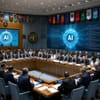The United Nations Security Council is holding a high-level debate on the global challenges posed by artificial intelligence, focusing on its implications for international peace and security. The meeting aims to explore ways to mitigate risks associated with AI, maximize its benefits, and define the Council's role in governing this rapidly evolving technology.
Secretary-General António Guterres emphasized that both military and non-military applications of AI could have serious consequences for global peace and security. The debate comes after the UN General Assembly adopted a resolution establishing two key bodies on AI: a global forum and an independent scientific panel of experts.
The Council's discussion centers around responsible AI use, compliance with international law, and strengthening UN initiatives on AI governance. Some member states advocate for proactive monitoring of AI risks, while others prefer broader discussions in the General Assembly.
Experts warn that without proper regulation, AI could pose significant threats, including engineered pandemics, widespread misinformation, and lethal autonomous weapons systems. To address these concerns, influential figures are calling for internationally agreed "red lines" on AI development and deployment.
The UN's efforts to establish a governance framework for AI mark a significant step in regulating this technology. However, concerns remain about the effectiveness of these measures in controlling rapidly advancing AI technologies. The establishment of a global forum and an independent panel of experts aims to foster international cooperation on AI safety.¹ ²
As the world navigates the complexities of AI governance, the UN's role in promoting cooperation and developing regulatory frameworks will be crucial in shaping the future of AI development and deployment.


